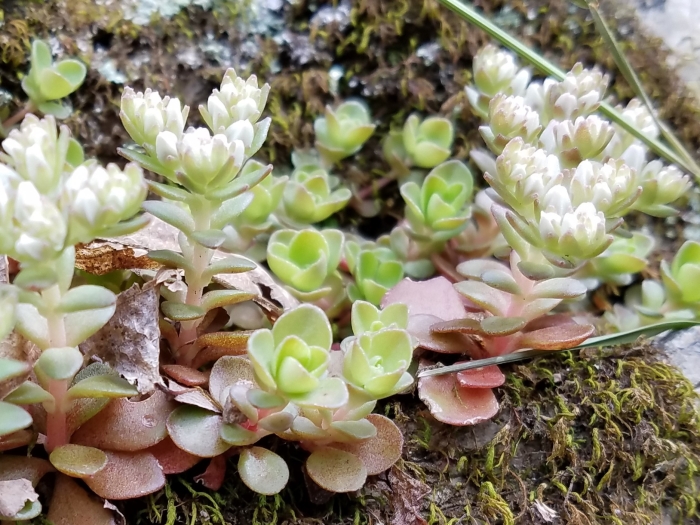Woodland Stonecrop
(Sedum ternatum)
Woodland Stonecrop (Sedum ternatum)
/
/

Leila Dasher
CC BY 4.0
Image By:
Leila Dasher
Recorded By:
Copyright:
CC BY 4.0
Copyright Notice:
Photo by: Leila Dasher | License Type: CC BY 4.0 | License URL: http://creativecommons.org/licenses/by/4.0/ | Rights Holder: Leila Dasher | Publisher: iNaturalist | Date Created: 2019-03-16T12:17:15-07:00 |



















































Estimated Native Range
Summary
Sedum ternatum, commonly known as Woodland Stonecrop, is a perennial herb that is the most widespread native Sedum species in eastern North America. It is a low-growing, mat-forming succulent that thrives in the dappled sunlight of forest floors and along stream banks in its native habitat. This species typically forms a dense carpet of fleshy, light green leaves, and its star-shaped white flowers bloom from April to May, adding a delicate touch to the shade garden. Woodland Stonecrop is particularly valued for its drought tolerance and its ability to grow in rocky or poor soils, making it an excellent choice for rock gardens and green roofs.
Woodland Stonecrop is appreciated for its ease of maintenance and its adaptability to a range of garden conditions, including urban environments. It is often used as a ground cover, in border fronts, rock gardens, or as a component of green roofs, where its succulent leaves can help retain moisture and reduce runoff. It prefers well-drained soils and can tolerate both full sun and part shade, although it appreciates some shade in hot climates to prevent scorching. While it requires very low amounts of water once established, it will benefit from slightly more moisture when grown in sunnier spots. Gardeners should be aware that while Sedum ternatum is generally pest-free, it can suffer from root rot if planted in poorly drained soils.CC BY-SA 4.0
Woodland Stonecrop is appreciated for its ease of maintenance and its adaptability to a range of garden conditions, including urban environments. It is often used as a ground cover, in border fronts, rock gardens, or as a component of green roofs, where its succulent leaves can help retain moisture and reduce runoff. It prefers well-drained soils and can tolerate both full sun and part shade, although it appreciates some shade in hot climates to prevent scorching. While it requires very low amounts of water once established, it will benefit from slightly more moisture when grown in sunnier spots. Gardeners should be aware that while Sedum ternatum is generally pest-free, it can suffer from root rot if planted in poorly drained soils.CC BY-SA 4.0
Plant Description
- Plant Type: Succulent, Herb
- Height: 0.3-0.5 feet
- Width: 0.5-0.8 feet
- Growth Rate: Moderate
- Flower Color: White
- Flowering Season: Spring
- Leaf Retention: Evergreen
Growth Requirements
- Sun: Full Sun, Part Shade
- Water: Medium
- Drainage: Medium, Fast
Common Uses
Bee Garden, Bird Garden, Butterfly Garden, Deer Resistant, Drought Tolerant, Fire Resistant, Groundcover, Hummingbird Garden, Low Maintenance, Rabbit Resistant, Rock Garden, Showy Flowers, Street Planting
Natural Habitat
Dappled sunlight of forest floors and along stream banks in eastern North America
Other Names
Common Names: Three-Leaved Stonecrop, Whorled Stonecrop, Mountain Stonecrop, Wild Stonecrop, Skogsfetknopp
Scientific Names: , Sedum ternatum, Sedum portulacoides, Anacampseros ternata, Clausenella ternata, Clausenellia ternata, Sedum americanum, Sedum deficiens, Sedum octogonum, Sedum ternatum var. minus,
GBIF Accepted Name: Sedum ternatum Michx.